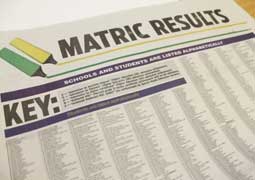
Parliament, Tuesday, 07 January 2020 - The Chairperson of the Portfolio Committee on Basic Education, Ms Bongiwe Mbinqo-Gigaba welcomes the 2019 National Senior Certificate (NSC) results which have shown a pass rate of 81.3%, a percentage she said confirms a great deal of hard work by learners, teachers and all other stakeholders within the sector.
“We applaud the continued hard work by all the stakeholders that have made an investment in the form of time and other resources in ensuring that our children have solid and adequate foundation in relation to education which will guarantee them a better future. We also applaud the successful learners and encourage those that have failed to try again as they have the potential to succeed,” Ms Mbinqo-Gigaba said.
The committee notes the evaluation that one of the pillars of the improvement is the maturation of the Curriculum Assessment Policy Statements (CAPS). The previous portfolio committees of Basic Education have highlighted the steady progress that is due mainly to the maturing system which showed improved outcomes, while at the same time they called for the need for simultaneous improvements where there are shortcomings.
The general improvement in the standard and complexity of questions augurs well for the quality of results produced by the system. “The system must produce learners who are able to cope in the fast changing and complex world as a result of globalisation and technological revolution of the 21st century. We are encouraged that qualitatively the 2019 cohort is better and this improvement is continuous as the system matures even further,” Ms Mbinqo-Gigaba emphasised.
The committee acknowledges the impact that various leaner support initiatives such as vacation classes and extra tuition time study camps have made on the qualitative improvement of the results and calls on the government to make more resources available for these initiatives, especially to disadvantaged leaners.
The impact of these leaner support initiatives to Quintile 1-3 schools, which are no fee schools, has been immeasurable hence the call for more resources. “The pronouncement that Quintile 1-3 schools contributed 55.3% on bachelors achieved this year is an empirical evidence that these initiatives need further investment and focus especially as the majority of the learners are found in these schools” reiterated Ms Mbinqo-Gigaba.
The continued impact of the Policy on Progression and the Policy on the Multiple Examination Opportunity (MEO) must be welcomed. The committee welcomes the announcement that 12 progressed learners received distinctions in mathematics and 25 got distinctions in Physical Science.
According to the committee, this indicates that initiatives that are aimed at giving learners a second chance are worthwhile and must be encouraged.
However, notwithstanding the remarkable improvements, Ms Mbinqo-Gigaba highlighted concerns in relation to the lack of improvement in the area of mathematics. The committee has since its inception highlighted the need for heightened focus on teaching and learning of mathematics which is important for the promotion of critical thinking, logic and problem solving. It has called for strategies that will lead to an improvement in the teaching and learning of mathematics.
Furthermore, the committee is concerned that there has been an increase in schools that received 0% pass rate. “It is concerning that 16 schools received 0% pass rate, an increase by five schools compared to 11 schools in 2018. The committee calls for urgent application of effective interventions at all the levels of the system to turn-around that emerging and unacceptable downward trajectory,” Ms Mbinqo-Gigaba said.
With regards to infrastructure challenges within the system, the committee has called for collaborative effort to ensure that all learners receive quality education in an environment that is conducive for teaching and learning and also calls for improved spending on infrastructure.
The committee notes with appreciation the impressive improvement by provinces especially those that had over 5% improvement in performance. It noted that the Eastern Cape improved its results by 5.9%, North West by 5.6% and KwaZulu-Natal by 5.1%.
While the results are impressive and deserve appreciation, the committee has called for improvements in the entire system not just on the exit point and has urged the department to investment enough time and resources to lower levels within the system to ensure that the sector performs better than it is currently doing especially for the benefit of the poorest of the poor.
As a start, the committee advises that the sector must move with speed to implement the migration of Early Childhood Development from social development to the Department of Basic Education. Furthermore, the committee calls for the ramping up of the Three Stream Model to give learners wider opportunities to perform within the technological era.
The committee will analyse the 2019 matric results at the right time and play its role in taking the entire sector to the new heights and ensure that the 2030 vision is realised in the next decade.
ISSUED BY THE PARLIAMENTARY COMMUNICATION SERVICES ON BEHALF OF THE CHAIRPERSON OF THE PORTFOLIO COMMITTEE ON BASIC EDUCATION, MS BONGIWE MBINQO-GIGABA.
For media enquiries or interviews with the Chairperson, please contact the committee’s Media Officer:
Name: Malatswa Molepo (Mr)
Parliamentary Communication Services
Tel: 021 403 8438
Cell: 081 512 7920
E-mail: mmolepo@parliament.gov.za

